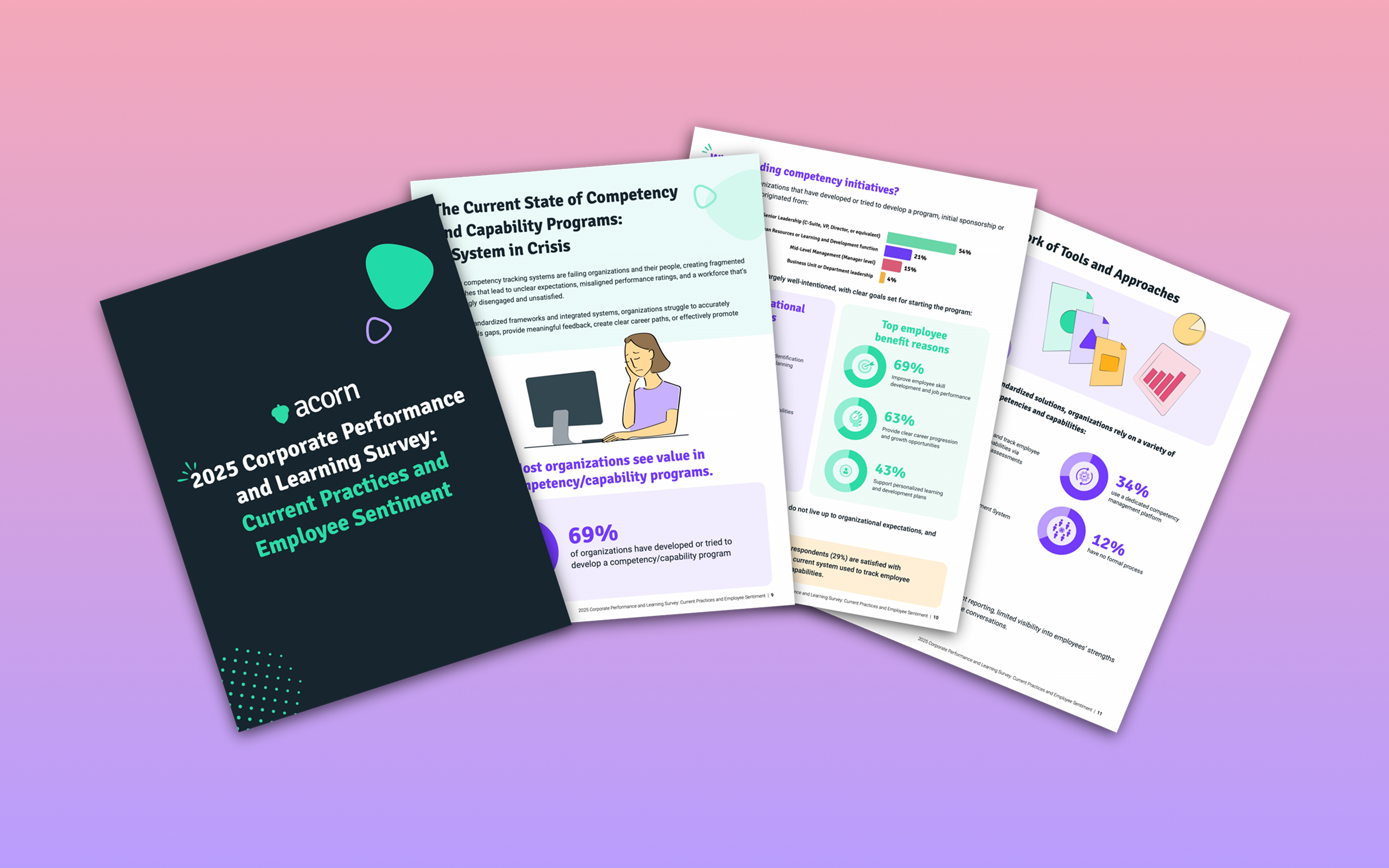Performance Reviews Make People Anxious (Plus 4 Other Takeaways from Our Latest Report)
Reading Time:

Lead the pack with the latest in strategic L&D every month— straight to your inbox.
SubscribeOur research reveals a deep crisis in performance management that’s driving talent out the door.
A stubborn commitment to outdated performance processes and learning programs—alongside poorly used (or a complete lack of) capability and competency frameworks—is telling people they don’t matter. And it’s causing organizations to unwittingly alienate their top talent.
Rather than helping their people grow, organizations are wasting tens of thousands of dollars on programs (and consultants) that actually erode trust, create emotional fallout, and push talent out the door.
The 2025 Corporate Performance and Learning Survey reveals where organizations are falling short—and what needs to change to build systems employees actually believe in. Here are some of our biggest takeaways from the study.
1. The emotional toll of broken systems is high
Unhelpful performance reviews don’t have a net-zero impact. They’re actively hurting people. (It’s up there with getting broken up with.) While performance systems (including tools and processes) were created to recognize and guide, 33% of employees say their last review felt like a bureaucratic tick-box. Even worse:
- 43% believe reviews fail to reflect their capabilities
- 29% say they feel anxious or stressed afterward
- 61% believe bias or favoritism influences reviews.
And (somehow) worse again: leaders seem unaware of the damage, or unwilling to implement change. 66% of executives believe their metrics are fair, compared to less than one-fifth of individual contributors.
2. Despite 69% of companies having attempted a capability framework, only 29% are satisfied with the results
The systems don’t deliver because they’re fragmented, and programs are run through an assortment of different tools and platforms—36% still use spreadsheets (!!!)—with no centralization.
There’s no one place to house data and no universal language to talk about performance. Nearly half (43%) of implemented programs are never fully integrated, and more than half take years and tens of thousands of dollars to develop.
And that’s those that even get their programs off the ground. Most competency initiatives simply become shelfware—no better than dusty participation trophies from school. (Don’t lie, we know you don’t want them when your parents ask you to take them.)
3. Most employees still believe in performance management—they just want it to work for them
People don’t want to abolish performance reviews altogether. 95% want to have two-way performance conversations that actually help them grow, and they believe it starts with HR infrastructure.
Rather than an arbitrary rating, 92% say a clear capability index—the average of a person’s cumulative proficiency rankings for their role-specific capabilities—would better reflect performance. 97% believe a centralized system would positively impact their business.
The problem is, 3 in 10 individual contributors have to leave to get any form of progression right now. It begs the question: are they leaving for greener pastures, or bouncing from broken system to broken system?
4. Human-informed AI is the lifeline
89% of respondents are open to using AI to define and assess capabilities to make performance fair and objective. That’s not without safeguards, though. People want to feel safe and informed using AI. The larger the organization, the more caution is involved. But there’s a chance for HR and L&D leaders to be using AI every day to make career progression equitable—it just requires the right system.
It’s something we’ve thought about a lot. Watch our Head of Capabilities, Ben Satchwell, break down the ethics of AI in capability building here.
5. The future is capability-centered and personalized
There’s overwhelming support for a new model: one that centers on capabilities tied to actual job roles, supported by smart systems. People want frameworks, tools, and role alignment. (Like, yesterday.)
Oh, and the wildest part? Nearly half of companies say they’re ready to spend $250K–$1M+ to get it right. That’s pretty much the same amount of money they’re spending on setting up capability programs manually.
Psst, we’re developing something just for this. Read the announcement for Capabilities AI here.
The bottom line
The current state of performance management makes employees feel unseen, managers feel unsupported, and shows executives are out of touch—even if it’s unwittingly.
We’ve failed our people up til now, but that doesn’t mean we have to stick to such a depressing status quo. There’s a bright future ahead, informed by capabilities and aided by AI doing the tedious tasks, so HR, L&D, and talent professionals can do the strategic work.
Read the full findings from our free report via the link below.